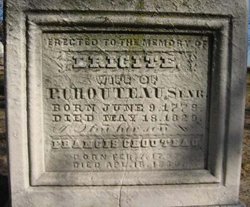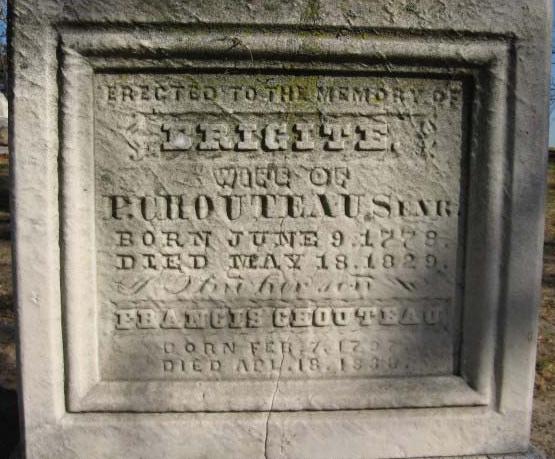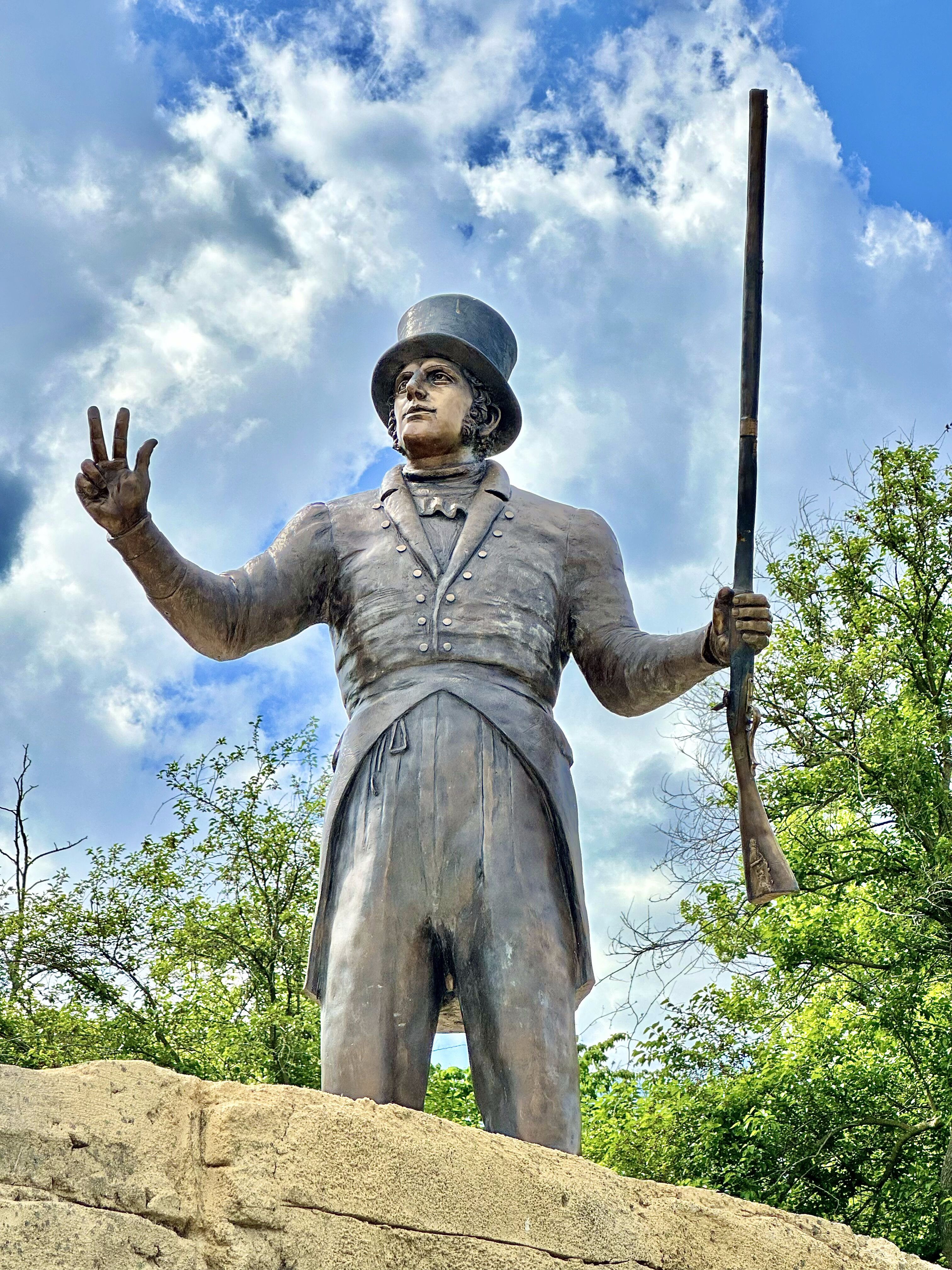He married Bernice Menard, who was born in Kaskaskia in 1801 and was the daughter of Pierre and Therese (Godin). The couple were married on 12 Jul 1819, their wedding journey said to have been a boat trip up the Missouri river in search of a site to build a trading post. The father of nine children, it is believe that Francois died of a heart attack at the age of forty-one on 18 Apr 1838, leaving his widow who survived him by fifty years.
Following is the Wikipedia article for Francois:
François Gesseau Chouteau was born to Jean Pierre Chouteau, a fur trader and prominent citizen, and his second wife Brigite Saucier in 1797 in St. Louis, at that time, under the authority of New Spain. His uncle René Auguste Chouteau had founded the city of St. Louis 33 years earlier. In his youth, François learned his father's trade. He married Bérénice Thérèse Ménard originally of Cahokia (Kaskaskia, Illinois) on 12 July 1819 in St. Louis before heading west into the frontier.
Chouteau and his cousin Gabriel S. Seres set up a temporary trading post for John Jacob Astor's American Fur Company on the Randolph Bluffs along the river in Clay County, Missouri in 1819. Seeking an ideal place for a permanent post, they continued to investigate several other locations as far north as Council Bluffs, Iowa. Chouteau, together with his wife and his brother Cyprien, finally chose a site on the banks of the Missouri River not far from the earlier post a few miles from the mouth of the "River Canses," known today as the Kaw or Kansas River. The place, called Chouteau's Landing, was located near the north end of present-day Grand Avenue in Kansas City, Missouri, and became the area's first permanent White settlement in 1821.
Several trappers joined them in 1825, including Gabriel Prud'homme and his family who were returning from an expedition in the Snake River region. Chouteau, with Prud'homme and his brother Cyprien as partners, created his own fur business. The company's warehouse became the headquarters for the company's western trading routes and engaged other members of the family clan. Following a flood in 1826, Chouteau moved his trading post to higher ground near present-day Troost Avenue's intersection with the river. Chouteau traveled widely throughout the Kansas Territory, exchanging manufactured trade goods for animal pelts from the Shawnee, Kickapoo, and other tribes with whom he had established long-standing good relations.
Chouteau, Bérénice and their family continued to grow in the years ahead. They established a home on the bluffs above the Missouri River and were active in affairs of the early French community. In 1835, Pierre La Liberté built a log cabin church dedicated to St. Francis Regis, and French missionary Father Bénédict Roux became its first parish priest. So many members of Chouteau's extended family were congregants that it became known as "Chouteau's Church," and Bérénice became its most important patron. Kansas City's Cathedral of the Immaculate Conception and its golden dome stand on the same site today.
François Chouteau died at age 41, probably of a heart attack, in Kansas City, Missouri on 18 April 1838. His funeral was held at the Old Cathedral of St. Louis in St. Louis one week later, on 25 April. He is now interred at Calvary Cemetery in St. Louis in a plot marked by a tall obelisk that includes his grave and those of his mother, Brigite (Saucier) Chouteau, and three children who died at a young age: Louis-Amédée, Louis-Sylvestre, and Benedict. François Chouteau is called the "Founder of Kansas City," however during his lifetime, he knew the city as "West Port."
After his death, his widow Bérénice supported her family in the merchandising end of the Chouteau family trade business, later running a retail store. She was active in the community, and was called the "Mother of Kansas City." Due to the violent armed conflicts in Westport and the surrounding area during the Civil War, she moved east, first to Ste. Genevieve, Missouri, then to Kaskaskia. Two years after the end of the war, in 1867, she returned to Kansas City with her son Pierre Chouteau and his wife. Bérénice outlived all of her children, passing away in 1888 at age 87.
From Wikipedia, the free encyclopedia
Here is a list of their children, taken from the above article:
Edmond François Chouteau, b. 1821 in St. Louis–d. 1853 in Jackson County, Missouri
Pierre Menard Chouteau, b. 1822 in St. Louis–d. 1885 in Jackson County, Missouri; married Marie Anne Polk
Louis Amédée Chouteau, b. 1825 in St. Louis–d. 1827 in St. Louis
Louis Sylvestre Chouteau, b. 1827 in St. Louis–d. 1829 in St. Louis
Benjamin Chouteau, b. 1828 in St. Louis–d. 1871 in St. Louis; married Anne E. Toler
Frederick D. Chouteau, b. 1831 in Independence, Missouri–d. after 1870; married Adèle Gregoire
Benedict Pharamond Chouteau, b. 1833 in Jackson County, Missouri–d. 1834 in St. Louis
Mary Brigite Chouteau, b. 1835 in Jackson County, Missouri–d. 1864 in St. Louis; married Ashley C. Hopkins
Thérèse Odile Chouteau, b. 1837 in Jackson County, Missouri–d. 1837 in Jackson County
James G. Chouteau, b. before 1825; Note: He was identified by name to receive 640 acres (one section) of land reserved for "half-breeds" according to a provision in Article 5 of the 1825 Osage Treaty.
No pictures remain of Kansas City's first homemakers. As far as is known, none was ever made of Francois Gesseau Chouteau. His wife had a picture of herself but destroyed it before her death because she did not want her likeness to be perpetuated without her husband's.
He married Bernice Menard, who was born in Kaskaskia in 1801 and was the daughter of Pierre and Therese (Godin). The couple were married on 12 Jul 1819, their wedding journey said to have been a boat trip up the Missouri river in search of a site to build a trading post. The father of nine children, it is believe that Francois died of a heart attack at the age of forty-one on 18 Apr 1838, leaving his widow who survived him by fifty years.
Following is the Wikipedia article for Francois:
François Gesseau Chouteau was born to Jean Pierre Chouteau, a fur trader and prominent citizen, and his second wife Brigite Saucier in 1797 in St. Louis, at that time, under the authority of New Spain. His uncle René Auguste Chouteau had founded the city of St. Louis 33 years earlier. In his youth, François learned his father's trade. He married Bérénice Thérèse Ménard originally of Cahokia (Kaskaskia, Illinois) on 12 July 1819 in St. Louis before heading west into the frontier.
Chouteau and his cousin Gabriel S. Seres set up a temporary trading post for John Jacob Astor's American Fur Company on the Randolph Bluffs along the river in Clay County, Missouri in 1819. Seeking an ideal place for a permanent post, they continued to investigate several other locations as far north as Council Bluffs, Iowa. Chouteau, together with his wife and his brother Cyprien, finally chose a site on the banks of the Missouri River not far from the earlier post a few miles from the mouth of the "River Canses," known today as the Kaw or Kansas River. The place, called Chouteau's Landing, was located near the north end of present-day Grand Avenue in Kansas City, Missouri, and became the area's first permanent White settlement in 1821.
Several trappers joined them in 1825, including Gabriel Prud'homme and his family who were returning from an expedition in the Snake River region. Chouteau, with Prud'homme and his brother Cyprien as partners, created his own fur business. The company's warehouse became the headquarters for the company's western trading routes and engaged other members of the family clan. Following a flood in 1826, Chouteau moved his trading post to higher ground near present-day Troost Avenue's intersection with the river. Chouteau traveled widely throughout the Kansas Territory, exchanging manufactured trade goods for animal pelts from the Shawnee, Kickapoo, and other tribes with whom he had established long-standing good relations.
Chouteau, Bérénice and their family continued to grow in the years ahead. They established a home on the bluffs above the Missouri River and were active in affairs of the early French community. In 1835, Pierre La Liberté built a log cabin church dedicated to St. Francis Regis, and French missionary Father Bénédict Roux became its first parish priest. So many members of Chouteau's extended family were congregants that it became known as "Chouteau's Church," and Bérénice became its most important patron. Kansas City's Cathedral of the Immaculate Conception and its golden dome stand on the same site today.
François Chouteau died at age 41, probably of a heart attack, in Kansas City, Missouri on 18 April 1838. His funeral was held at the Old Cathedral of St. Louis in St. Louis one week later, on 25 April. He is now interred at Calvary Cemetery in St. Louis in a plot marked by a tall obelisk that includes his grave and those of his mother, Brigite (Saucier) Chouteau, and three children who died at a young age: Louis-Amédée, Louis-Sylvestre, and Benedict. François Chouteau is called the "Founder of Kansas City," however during his lifetime, he knew the city as "West Port."
After his death, his widow Bérénice supported her family in the merchandising end of the Chouteau family trade business, later running a retail store. She was active in the community, and was called the "Mother of Kansas City." Due to the violent armed conflicts in Westport and the surrounding area during the Civil War, she moved east, first to Ste. Genevieve, Missouri, then to Kaskaskia. Two years after the end of the war, in 1867, she returned to Kansas City with her son Pierre Chouteau and his wife. Bérénice outlived all of her children, passing away in 1888 at age 87.
From Wikipedia, the free encyclopedia
Here is a list of their children, taken from the above article:
Edmond François Chouteau, b. 1821 in St. Louis–d. 1853 in Jackson County, Missouri
Pierre Menard Chouteau, b. 1822 in St. Louis–d. 1885 in Jackson County, Missouri; married Marie Anne Polk
Louis Amédée Chouteau, b. 1825 in St. Louis–d. 1827 in St. Louis
Louis Sylvestre Chouteau, b. 1827 in St. Louis–d. 1829 in St. Louis
Benjamin Chouteau, b. 1828 in St. Louis–d. 1871 in St. Louis; married Anne E. Toler
Frederick D. Chouteau, b. 1831 in Independence, Missouri–d. after 1870; married Adèle Gregoire
Benedict Pharamond Chouteau, b. 1833 in Jackson County, Missouri–d. 1834 in St. Louis
Mary Brigite Chouteau, b. 1835 in Jackson County, Missouri–d. 1864 in St. Louis; married Ashley C. Hopkins
Thérèse Odile Chouteau, b. 1837 in Jackson County, Missouri–d. 1837 in Jackson County
James G. Chouteau, b. before 1825; Note: He was identified by name to receive 640 acres (one section) of land reserved for "half-breeds" according to a provision in Article 5 of the 1825 Osage Treaty.
No pictures remain of Kansas City's first homemakers. As far as is known, none was ever made of Francois Gesseau Chouteau. His wife had a picture of herself but destroyed it before her death because she did not want her likeness to be perpetuated without her husband's.















